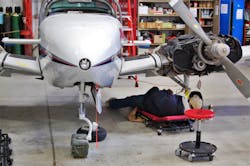At first glance, the aircraft and automotive industries seem vastly different, especially technically and mechanically. But when it's stripped down to the basics, maintenance of both requires very similar tools and equipment. In fact, there are enough similarities between the two that mobile tool distributors who normally service automotive repair shops can also service aircraft maintenance facilities without making changes or additions to their existing truck stock.
Tool categories to stock
It shouldn't require a whole new inventory to service aviation technicians. While aviation, like all trades, has specific specialty tools for the job, largely mechanics is just mechanics and a tool is just a tool. Aviation technicians still use standard tools and equipment and are familiar with and use many of the same brands automotive technicians do. The difference between the two comes down to tool preferences, like certain preferred angles and tool profiles, as well as different job-site logistics.
Distributors should be able to service the aviation market just fine with their existing automotive-focused stock, but to really get the most out of servicing aviation customers, consider stocking these categories and keeping the following selling points in mind.
- Small-profile hand tools
When it comes to wrenches, ratchets, pliers and other hand tools, the most-wanted feature for aviation technicians is a slim profile. Getting into tight spaces is a frustration for any technician, but for the aviation technicians who work in particularly cramped spaces, it's a must-have.
While thin tools are a main selling point, the tools also have to be made of high-quality materials able to withstand pressure and high-torque applications.
Additionally, wire cutters, pliers and crimpers are commonly used tools in aviation, explains General Manager Jeff Davis. Because of the heavy vibrations aircraft endure, every bolt on a component in an aircraft engine is fastened with stainless steel safety wire. Typically, a hole is drilled into a part and then wire is threaded through, twisted and then anchored to a second part before being twisted again. This ensures that if one bolt starts to loosen, another gets tightened. Safety wire is everywhere, therefore tools used for wire applications are sure to be everywhere, too.
- Low-height tool storage and storage accessories
Like automotive repair shops, space is at a premium in airport hangars. While the space is usually expansive, the wing span on even small jets limits working area. Furthermore, the logistics of the workspace changes sometimes daily because different sized aircraft are being Tetris-ed into the space available for service. Generally, that means technicians need their tool storage to be mobile, short enough to slide under the wing of most aircraft (no toolbox hutches or top boxes) and easily controlled to prevent dents and scrapes on aircraft (think: wheel lock features, bumpers and remote controlled movement).
Aircraft technicians are notoriously well-organized. Popular tool storage accessories include wrench racks and socket holders, as well as foam drawer liners which allow technicians to outline and cut out customized spaces for their tools, and therefore keep track of where they are at all times. A major concern in the industry is tool accountability. If a hand tool is left in an engine during flight, it could have catastrophic effects.
- Adjustable seating creepers and stools
To comfortably repair aircraft, adjustable creepers and stools are a must-have. Because most maintenance facilities service a variety of aircraft of all different sizes, it's important for technicians to have versatility with their creepers.
Remember, though, airplanes are typically higher off the shop floor than vehicles.
"The low-profile creepers that are in a mechanic’s shop are not necessarily the need in an aircraft maintenance facility due to the height of the product that is being worked on," explains Omega Lift's Marketing Manager Stephen Bailey. "Larger wheels, in my opinion, would be one of the bigger factors in making a selection to these types of customers, along with versatility of product that would include … the ability to convert from creeper to stool."
Omega Lift is SFA Company's brand of lifting products and shop equipment.
- Clamp lights
Lighting is essential for technicians of all kinds and can be a no-brainer sale. But pay particular attention to the types of lights you market toward the aviation industry. Remember, aircraft are predominately made of aluminum, which doesn't work well with magnets. So, lighting with secure clamps may be the way to go with this clientele.
Ullman Devices, for example, has a Clamp Work Light, No. CL-6SMD, which offers a multi-surface soft grip, secure clamp with a swivel light head to direct light to several places without repositioning the light. Ullman is a manufacturer specializing in inspection mirrors, pick up tools and more.
"If the material they're working on is aluminum or fiberglass, like in certain parts of an aircraft, a magnet’s not going to stick," Ullman Devices Marketing Manager Mike Barthel says. "The versatility of this clamp allows it to work on anything from a car hood ... to a creeper."
How to approach aircraft maintenance facilities
When many people think of airports, they think of long TSA security lines, strict rules and restricted areas. But, providing service to an airport doesn't always fall under those same characteristics. If distributors know how to navigate the area, talk to the right authority and conduct business professionally, getting access to aircraft maintenance facilities and its technicians can be just as simple as rolling up to a standard automotive repair shop.
Now, of course, most of that time that won't mean having access to the tarmac. What you will most likely have access to, though, is a general service entrance. A lot of the time that includes a public access road, parking lot, main lobby and reception area. Think: car dealership.
Perhaps the closest aviation industry equivalent to the car dealership repair shops a tool distributor works with, is something called an FBO (fixed-based operator). To put it simply, an FBO is usually a tenant of a larger public airport. They service private pilots and business jets by providing fueling, aircraft parking, pilot accommodations and maintenance. These are the facilities most easily accessible to mobile tool distributors because they have a marked public entrance. And, if they offer aircraft maintenance, there's likely even a 'service entrance.'
See the sidebar, "How to find aircraft maintenance facilities on your route" for tips on how to find contact information and customers in your area.
The best bet when approaching an airport or maintenance facility is to contact the department manager and determine the best time of day to stop in, explains Jeff Davis, general manager for full-service FBO Wisconsin Aviation located in Madison, Wisconsin. While deciding those logistics, it's important to discuss other items, like where to park and if there are any special access instructions.
About the Author
Vesna Brajkovic
Associate Editor - Vehicle Repair Group
Vesna Brajkovic is a former associate editor for the Vehicle Repair Group.
Brajkovic has covered the transportation industry for a number of trade publications, with a focus on the vehicle maintenance and automotive aftermarket industries since 2016. Prior to that, she covered the global aviation industry as assistant editor for Endeavor Business Media's AviationPros.com, and held a number of editorial positions at an award-winning community newspaper.

